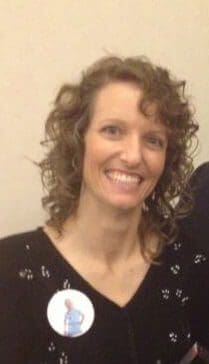What do you see when you walk by someone on the street with Down syndrome? Do you notice their distinctive stride or smile? Do the differences in their appearance stick out in your mind or catch your attention?
Having a child with Down syndrome qualifies me as an expert in most people’s minds, and I get asked quite often, “How should I treat your daughter?” or “What is the appropriate way to act towards people with Down syndrome?” The most obvious but completely right answer to those questions is, “The same way you treat everybody else.”
Down syndrome is a genetic condition resulting from an extra copy of the twenty-first chromosome. It is actually the most common genetic condition, occurring in one out of every 691 babies in the United States annually. This additional genetic material alters the course of development and causes the characteristics associated with Down syndrome.
There are many misconceptions floating around about Down syndrome, people with Down syndrome and their families. Here are my top ten facts about Down syndrome that most people don’t know:
1. Down syndrome doesn’t define a person.
Down syndrome is simply one small part of who someone is. Having Down syndrome doesn’t prevent anyone from going after their dreams. As people aren’t judged for the color of their skin, we shouldn’t judge people by their different abilities.
2. People with Down syndrome have successful careers.
There is nothing holding those with Down syndrome back from succeeding. Researchers have found that those with Down syndrome have a high adaptive skill. This allows them to succeed in their day-to-day living and work skills. Each and every person has potential, especially those with Down syndrome. After all, they are born with a little extra.
3. Having Down syndrome does not make you less special.
With a little bit of patience, you will discover that those with Down syndrome have different personalities, interests, and hobbies. Dispositions range from loud to quiet, bubbly to serious, and outgoing to shy. Never assume an adult or child with Down syndrome is always cheerful, but get to know their true identity and temperament.
4. It’s ok to ask for someone to slow down or repeat themselves.
Low muscle tone is common among those with Down syndrome, and can affect their speech patterns, making them difficult to understand. Learning to communicate with someone who speaks differently can be a difficult task; asking for clarification shows that you are trying to learn. Just remember to be extra-attentive.
5. Being born with Down syndrome does not make you a failure.
With proper education, a loving support system, and dedicated teachers, those with Down syndrome do lead happy lives. Across the country, there are dozens of cases where adults have graduated from college and owned and operated businesses. Some have become distinguished artists, and some have even led successful social movements.
In a survey of 284 people with Down syndrome, 99 percent say that they were happy with their lives. If that is not success, I’m not sure what is.
6. People with Down syndrome simply need a little more time.
They don’t need you to do everything. In most cases, they’re able to do the same things you can, just at their own pace. They want to be able to do things by themselves, and if they do need help, they’ll ask.
7. They’re able to live alone.
Some adults do prefer to stay at home with family, but others enjoy the freedom of living alone. It’s an individual decision that varies from person to person. There’s no reason to assume that those with Down syndrome will need assistance forever; they just need a little more at the beginning.
8. Down syndrome is not contagious in ANY way.
Down syndrome, the genetic addition of an extra chromosome, can manifest itself in many different ways depending on the person; however, this is something the person is born with and is not passed on to others.
9. Having a child born with Down syndrome is a GIFT and a BLESSING, not a tragedy.
We all have our own take on life that’s created by the challenges we overcome. Those with Down syndrome have their own perspective, which often times, is unique and beautiful. This perspective has a quantifiable aspect as well.
Researchers from the Kennedy Research Center found that the divorce rate in families with a child with Down syndrome was 10.8 percent lower than in those without a differently-abled child. In another study, 88 percent of siblings reported feeling that they themselves were better people for having a younger sibling with Down syndrome. It is honestly a blessing to have a person with Down syndrome in your life.
10. Watch how your reference…
It is “Down syndrome” – not “Downs Syndrome.” If you must refer to a condition, use neutral language. Avoid using the following terms: “disability,” “afflicted with,” “stricken with,” “suffers from,” “victim of,” “defect,” “defective,” “special,” or “special needs.”
Appropriate words to use: “intellectually and developmentally challenged,” “cognitively challenged,” or “differently-abled.” Don’t make conditions sound like a disease and never refer to a condition as an illness. Also, it is important to remember to refer to the child or adult as ” a child or adult with Down syndrome”. After all, they are people first.
Each and every person with Down syndrome is unique… Just like every other person in your community. They may just need the opportunity to show you who they really are. A few extra seconds can create a beautiful and lasting friendship.
So the next time you see someone with Down syndrome, take your time and get to know them, allow them into your life just as you would anyone else. I promise you won’t regret it, and you will be a better person because of them.
Candy Bogardus is a founder of Lowcountry Down Syndrome Society, a family support group to benefit people with Down syndrome and their families through local leadership, outreach, education, and advocacy to champion and celebrate acceptance and inclusion. Bogardus can be reached at jcbogardus@gmail.com or 912-663-8573

